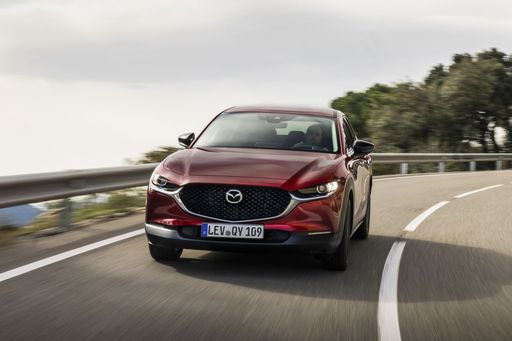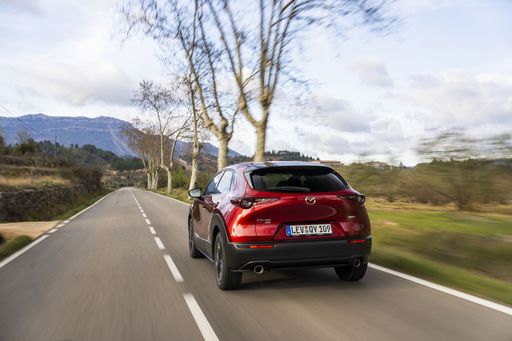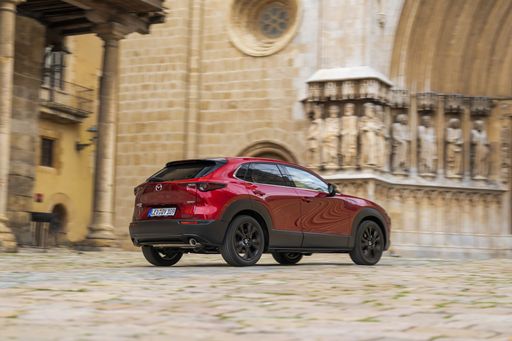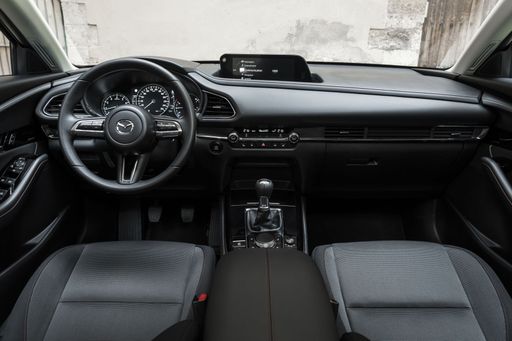Mazda MX-30 VS Toyota Prius – Specs, Efficiency & Price Comparison
Which model is the better choice – the Mazda MX-30 or the Toyota Prius? We compare performance (170 HP vs 223 HP), boot capacity (350 L vs 284 L), efficiency (18.30 kWh vs 0.50 L), and of course, the price (30800 £ vs 39400 £).
Find out now which car fits your needs better!
The Mazda MX-30 (SUV) is powered by a Plugin Hybrid engine and comes with a Automatic transmission. In comparison, the Toyota Prius (Hatchback) features a Plugin Hybrid engine and a Automatic gearbox.
When it comes to boot capacity, the Mazda MX-30 offers 350 L, while the Toyota Prius provides 284 L – depending on what matters most to you. If you’re looking for more power, you’ll need to decide whether the 170 HP of the Mazda MX-30 or the 223 HP of the Toyota Prius suits your needs better.
There are also differences in efficiency: 18.30 kWh vs 0.50 L. In terms of price, the Mazda MX-30 starts at 30800 £, while the Toyota Prius is available from 39400 £.
Compare all the key specs now and find out which model fits your lifestyle best!
Mazda MX-30
The Mazda MX-30 is a compact crossover that combines unique design with an environmentally conscious approach. Its distinct exterior features a coupe-like silhouette and freestyle doors that offer practicality and style. Inside, the cabin boasts sustainable materials, creating a harmonious blend of modern aesthetics and eco-friendly innovation.
details @ de.mazda-press.com
@ de.mazda-press.com
 @ de.mazda-press.com
@ de.mazda-press.com
 @ de.mazda-press.com
@ de.mazda-press.com
 @ de.mazda-press.com
@ de.mazda-press.com
Toyota Prius
The Toyota Prius stands as a pioneer in the realm of hybrid vehicles, offering an eco-friendly driving alternative with its innovative technology. Its aerodynamic design and comfortable interior make it a practical choice for those looking to reduce their carbon footprint without sacrificing style. Additionally, the Prius boasts a reputation for reliability and efficiency, contributing to its lasting popularity among environmentally conscious drivers.
details @ Toyota
@ Toyota
 @ Toyota
@ Toyota
 @ Toyota
@ Toyota
 @ Toyota
@ Toyota

|

|
|
|
|
Costs and Consumption |
|
|---|---|
|
Price
30800 - 37100 £
|
Price
39400 - 45800 £
|
|
Consumption L/100km
-
|
Consumption L/100km
0.5 - 0.7 L
|
|
Consumption kWh/100km
18.30 kWh
|
Consumption kWh/100km
-
|
|
Electric Range
85 km
|
Electric Range
72 - 86 km
|
|
Battery Capacity
-
|
Battery Capacity
-
|
|
co2
22 g/km
|
co2
12 - 17 g/km
|
|
Fuel tank capacity
-
|
Fuel tank capacity
40 L
|
Dimensions and Body |
|
|---|---|
|
Body Type
SUV
|
Body Type
Hatchback
|
|
Seats
5
|
Seats
5
|
|
Doors
5
|
Doors
5
|
|
Curb weight
1849 kg
|
Curb weight
1620 - 1630 kg
|
|
Trunk capacity
332 - 350 L
|
Trunk capacity
284 L
|
|
Length
4395 mm
|
Length
4599 mm
|
|
Width
1848 mm
|
Width
1782 mm
|
|
Height
1555 mm
|
Height
1470 mm
|
|
Payload
402 kg
|
Payload
365 - 375 kg
|
Engine and Performance |
|
|---|---|
|
Engine Type
Plugin Hybrid
|
Engine Type
Plugin Hybrid
|
|
Transmission
Automatic
|
Transmission
Automatic
|
|
Transmission Detail
-
|
Transmission Detail
-
|
|
Drive Type
Front-Wheel Drive
|
Drive Type
Front-Wheel Drive
|
|
Power HP
170 HP
|
Power HP
223 HP
|
|
Acceleration 0-100km/h
9.10 s
|
Acceleration 0-100km/h
6.80 s
|
|
Max Speed
140 km/h
|
Max Speed
177 km/h
|
|
Torque
-
|
Torque
-
|
|
Number of Cylinders
-
|
Number of Cylinders
4
|
|
Power kW
125 kW
|
Power kW
164 kW
|
|
Engine capacity
830 cm3
|
Engine capacity
1998 cm3
|
General |
|
|---|---|
|
Model Year
2025
|
Model Year
2023
|
|
CO2 Efficiency Class
B
|
CO2 Efficiency Class
B
|
|
Brand
Mazda
|
Brand
Toyota
|
Mazda MX-30
The Electric Revolution: Mazda MX-30
The Mazda MX-30 represents a bold leap into the realm of sustainable mobility, bringing a distinct blend of style, efficiency, and innovation. As Mazda's first all-electric vehicle, the MX-30 is designed to capture the hearts of eco-conscious drivers while delivering the fun driving experience the brand is known for. Let’s delve into what makes this vehicle stand out in the increasingly crowded electric vehicle market.
Sleek Design Meets Practicality
The MX-30 is a compact SUV that exudes a modern aesthetic with its clean lines and contemporary silhouette. Measuring 4,395 mm in length and 1,848 mm in width, the MX-30 is designed to navigate city streets with ease. Its unique freestyle doors facilitate easy access to the front and rear seats, accommodating up to five passengers comfortably.
Advanced Electric Powertrain
At the heart of the MX-30 is Mazda's e-SKYACTIV drivetrain, available in both fully electric and plug-in hybrid variants. The electric version delivers a respectable 145 PS (107 kW), whereas the plug-in hybrid offers an enhanced 170 PS (125 kW). Both versions employ front-wheel drive with a single-speed reduction gearbox, ensuring a smooth and responsive ride.
Efficiency and Range
The MX-30 showcases commendable efficiency with a power consumption ranging from 17.5 to 17.9 kWh per 100 km. Drivers can expect a maximum electric range of 200 km for the fully electric model, while the plug-in hybrid offers 85 km on electric power alone. This ensures the MX-30 is well-suited for both daily commutes and extended journeys.
Elegant Interiors and Cutting-Edge Technology
Inside, the MX-30 presents a zen-like cabin featuring sustainable materials like cork and recycled fabrics, reinforcing Mazda’s commitment to environmental consciousness. The vehicle comes equipped with a host of technological advancements, including a digital dashboard and a user-friendly infotainment system that keeps drivers connected and informed on the go.
Performance and Handling
Mazda's dedication to driving pleasure continues with the MX-30. With an acceleration time from 0-100 km/h between 9.1 to 9.7 seconds and a top speed of 140 km/h, it promises an engaging drive. The low centre of gravity, courtesy of the battery placement, and its precise steering ensure the MX-30 feels agile and responsive, whether navigating urban environments or open roads.
Safety and Features
Safety is paramount in the MX-30, which boasts an array of advanced features, including collision avoidance systems and a reinforced body structure. It also scores well on CO2-efficiency, rated between Class A and B, making it a responsible choice for eco-minded consumers.
Conclusion: Mazda MX-30 – A Vision of the Future
In conclusion, the Mazda MX-30 is a testament to the brand's innovative spirit and commitment to sustainability. With its combination of striking design, efficient powertrains, and cutting-edge technology, the MX-30 is a formidable competitor in the electric vehicle market. Offering a blend of sophistication and performance, it is poised to win over motorists who seek an environmentally friendly vehicle without compromising on driving joy.
Toyota Prius
The All-New Toyota Prius: Revolutionising Efficiency and Performance
The Toyota Prius, a name synonymous with hybrid innovation, has once again shown why it remains at the forefront of eco-friendly automotive technology. The latest models have enhanced technical features and innovations, setting new standards for efficiency and driving experience.
Hybrid Performance: A Leap Forward
The latest Prius models employ a sophisticated 2.0 litre Plug-in Hybrid system that flawlessly melds petrol and electric power. With a power output of 223 PS, it propels the Prius with impressive dynamism, reaching 0-100 km/h in just 6.8 seconds. This performance-oriented aspect of the Prius does not compromise on efficiency, with an astonishing fuel consumption ranging from 0.5 to 0.7 L/100km.
Electric Range and Efficiency
One of the key highlights of the new Prius is its substantial electric-only range. Depending on the variant, it can travel between 72 to 86 km on electric power alone, making it an ideal choice for urban commutes where zero emissions are preferred. The hybrid system's CO2 emissions are remarkably low, between 12 and 17 g/km, contributing to its CO2 Efficiency Class B rating.
Engineering Excellence with CVT
The Prius is equipped with a state-of-the-art Continuously Variable Transmission (CVT), ensuring a smooth and efficient drive. This advanced transmission supports the front-wheel-drive layout, delivering power seamlessly and enhancing driving pleasure without sacrificing fuel economy.
Stylish Design and Comfort
Designed as a sleek five-door hatchback, the Prius offers a comfortable and spacious interior with seating for five passengers. It measures 4599 mm in length, 1782 mm in width, and 1470 mm in height, offering a practical balance of size and comfort. The boot space, while tailored for the hybrid battery, still provides a decent 284 litres of storage.
Cost Efficiency
The running costs of the Prius are competitive, with monthly expenses estimated between €1064 and €1188, and cost per kilometre ranging from 42.6 to 47.5 cents. Its efficient design results in a maximum speed of 177 km/h and a practical fuel tank size of 40 litres, ensuring less frequent stops on longer journeys.
Conclusion: The Prius Legacy Continues
The Toyota Prius continues to lead by example in the realm of hybrid technology. Combining impressive power with unmatched efficiency and a sophisticated driving experience, it is clear that the Prius remains a compelling choice for the environmentally conscious driver. Its innovative features and favourable cost metrics only bolster its appeal in the modern automotive landscape.
The prices and data displayed are estimates based on German list prices and may vary by country. This information is not legally binding.
